Contents
The Imrus apple tree is a frost-resistant, low-maintenance variety. The culture has a high immunity to scab, as it was bred using innovative technologies. Breeders put the Vf gene into the hybrid, which prevents the fungal disease from infecting the plant.
History of breeding
The parents of the winter apple tree Imrus were the usual Antonovka and the hybrid form OR18T13. The variety was obtained in 1977 at the All- Institute of Fruit Crop Breeding. The organizers of the culture were Yu.I. Khabarov, Z.M. Serov, V.V. Zhdanov, E.N. Sedov.
The apple tree was included in the State Register in 1996. Since 2000, the Imrus variety has been recommended for cultivation in various regions of Our Country. In addition, the apple tree is zoned in six regions of Belarus.
Description and characteristics of the Imrus apple tree
Winter apple tree Imrus is a fruitful variety. The fruits are sweet and sour, juicy, long shelf life.
tree appearance
The plant is compact. The height of the Imrus apple tree on a dwarf rootstock reaches 3-4 m, in other cases – 5-6 m. The crown of the plant is dense, moderate. The shoots are painted brown, the bark is rough. Skeletal branches are crooked, their ends are directed upwards. The leaves are medium in size, oblong in shape. On the rim, the leaf plate is wavy.
Description of fruits
The shape of the apples is round. The skin is glossy, smooth, too thin. Careless handling of the fruits will lead to a violation of its integrity. At the initial stage, the apples are colored green. As it matures, the skin tone changes to light yellow. The apple is covered with crimson stripes.
The weight of the fruit ranges from 130 to 180 g. The pulp is fine-grained, painted in a pale yellow color. When removed from the tree, apples taste sour, the main sweetness of the fruits is gained in winter maturation. The fruit pulp contains a large amount of vitamins (including ascorbic acid), pectin and sugar.
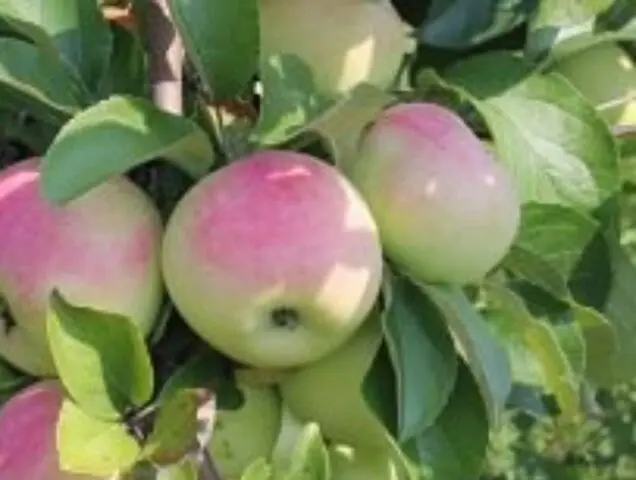
Professional tasters rated the taste of Imrus fruits at 4,3 out of 5 possible points.
Apples are suitable for fresh consumption, preparation of juices, compotes, mashed potatoes. During test runs, the juice yield was 63%.
Flowering
Imrus flowers bloom in early May. They are painted in a pale pink tone, collected in inflorescences of 4-6 buds. The variety is characterized by abundant flowering.
Pollinators of the apple tree Imrus
Flowers are partially self-fertile. For maximum yield, it is recommended to plant pollinating apple trees of other varieties nearby. The flowering of the Imrus apple tree should coincide with them in time. The best neighbors are: Lobo, Golden Delicious, Kandil Orlovsky, Orlik, Welsey.
Ripening dates for the Imrus apple tree
Ripening times vary by region. On average, apples are picked from the tree in mid-September. Later, they begin to crumble.
Productivity
Depending on the rootstock, trees enter the fruiting phase in different ways. If these are dwarf specimens, you can wait for the harvest in three years. On the seed stock – not earlier than five years of age. The peak of productivity occurs on an apple tree at 5-8 years, after which the intensity gradually decreases.
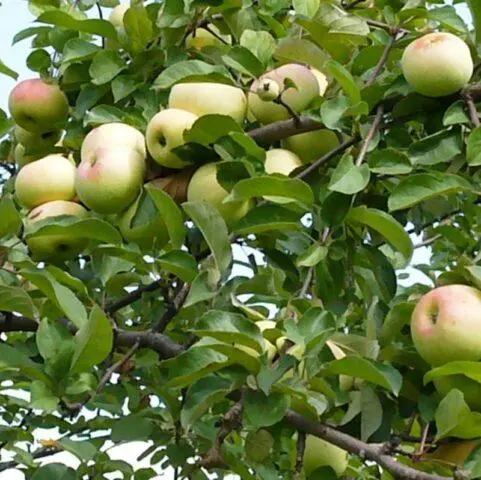
At the age of 4-6 years, from 30 to 40 kg of apples are harvested from one tree.
Frost resistance of the apple tree Imrus
Imrus withstands frosts down to -40 ᵒС. If the temperature stays at a lower level for a long time, the tree freezes slightly, but recovers within a few years.
Disease resistance
Variety Imrus has a high immunity to scab. But due to the incompetent actions of the gardener, the apple tree is depleted, it can be subject to ailments:
- Black cancer. Appears as a result of sunburn and violation of the rules of pruning.
- A bacterial burn is caused by bacteria at high humidity.
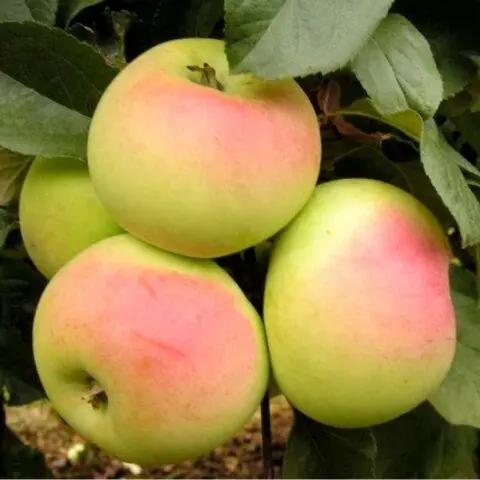
It is recommended to periodically inspect the tree for the appearance of diseases in order to take timely action.
Advantages and disadvantages
The fruits of Imrus are environmentally friendly. There is no need to treat the tree for scab.
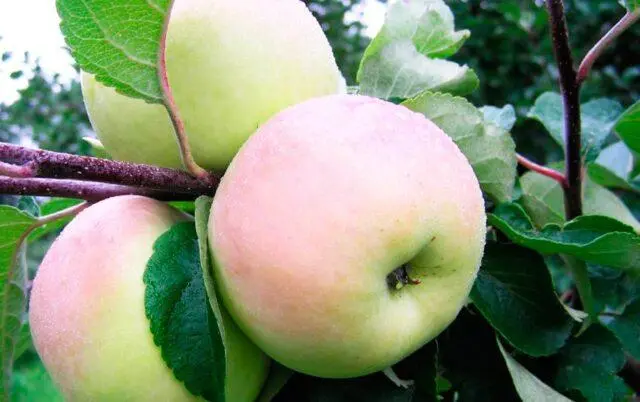
Apple tree Imrus withstands temperatures down to -40ᵒС
Pros:
- excellent taste;
- increased frost resistance;
- scab immunity;
- high yields;
- long shelf life.
Cons:
- thin peel of ripe fruits;
- needs to plant pollinators;
- flaking.
How to plant an apple tree Imrus
Seedlings of the Imrus variety are recommended to be planted in April. The soil should warm up well. If you have to plant trees in the fall, the most optimal time is the end of September or the beginning of October.
A place under a tree is chosen on the sunny side of the site. Groundwater on it should not be close to the surface. Variety Imrus does not like through winds. The seedling should not be shaded by taller trees, fences, or residential buildings. Fruits that ripen in the sun have a bright color, taste is more pronounced.
Before planting an apple tree, the site is dug up, having previously distributed fertilizers. 1 m2 make 15 g of nitroammophoska, 2 kg of peat and 8 kg of humus.
A hole for planting is dug in advance. Its depth is 60 cm, width – 80 cm. A drainage layer of broken brick or gravel is laid at the bottom of the pit. This allows you to maintain the root in a normal state.
Important rules for planting an apple tree:
- The root of the plant is covered with layers of 10-15 cm. Each of them is well compacted.
- After planting, a peg is placed next to the seedling, tied up.
- The root neck should protrude 5-7 cm above the ground level.
- After planting, the tree is watered abundantly.
The soil, which is sprinkled with the root of the seedling, must be fertile. It is prepared from a nutrient layer of humus and peat (2:2:1).
Care instructions
In the Moscow region, the Imrus apple tree needs special care. The climatic conditions in the region can hardly be called favorable for cultivation. In summer, it is unbearably hot here, in winter frosts prevail, and sharp changes in air temperature often occur. Either it will rain, or you have to wait for a long time. The gardener will have to sweat a lot to get a good harvest.
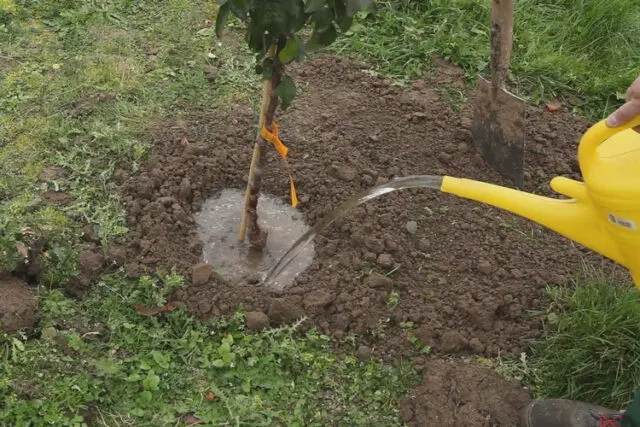
Regular watering is a guarantee that the apple tree will take root and grow.
Young trees are watered frequently, the soil should not dry out. Mature trees do not need a lot of water, 4-5 waterings per growing season are enough for them.
Proper pruning increases the yield and quality of apples, and also prevents the development of diseases. Pruning is carried out annually, before the start of sap flow. Dry and diseased branches must be removed.
From the third year of life, the apple tree begins to be fed. In the spring, a solution of nitroammophoska is added under the root at the rate of 1 tbsp. l. product in a bucket of water. Imrus needs to be fed in the fall. For these purposes, complex mineral fertilizers are suitable.
In regions with severe winters, it is necessary to mulch the root circle. If cracks or wounds appear on the tree, they are treated with garden pitch.
Fighting diseases and pests
Moderate watering, timely pruning, fertilizing will minimize the damage to the apple tree by diseases. Treating trees for ailments comes down to regular garden care. If signs of illness still appear on the Imrus apple tree, it is necessary to treat the tree with disinfectants.
Not only gardeners like the Imrus apple tree. Often it is chosen by parasites. Pest Control Methods:
- they fight with an apple flower beetle with a solution of lime. The plant is sprayed once a week;
- the apple sawfly is dangerous for the harvest. It is important to regularly dig up the soil in the root circle, carry out preventive spraying with copper sulphate;
- you can fight aphids with a soapy solution or a solution of soda ash. If it doesn’t help, proceed to the use of insecticides – Twix, Confidor Maxi, Aktara.
Spraying trees with insecticides and fungicides during fruit ripening is not recommended.
Harvesting and storage of crops
The fruits of Imrus are harvested from the tree in mid-September. Apples of this variety need time to ripen. The fruits are carefully placed in wooden boxes. If the apples are injured, they lose their presentation, the keeping quality decreases. They are recommended to eat no earlier than November. Apples reach their maximum sweetness by the end of winter.
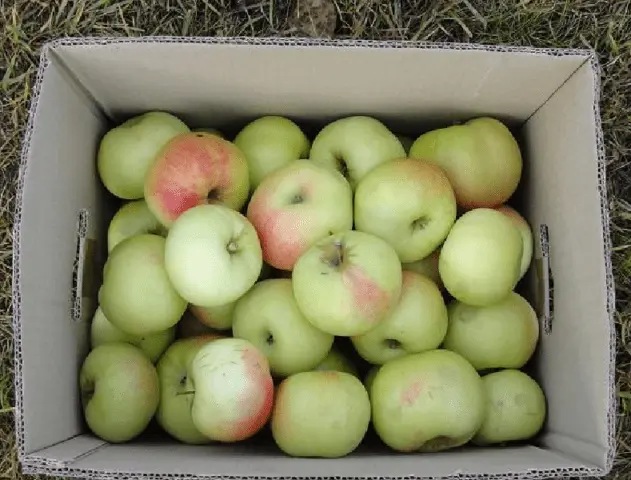
Under the right storage conditions (dark cool room), the fruits retain their marketable appearance until the end of February.
Conclusion
The Imrus apple tree will provide the gardener with a supply of vitamins until the end of winter. The main thing is to properly care for her during the first four years. Such indicators as good transportability, long shelf life and high yields form demand for seedlings.









